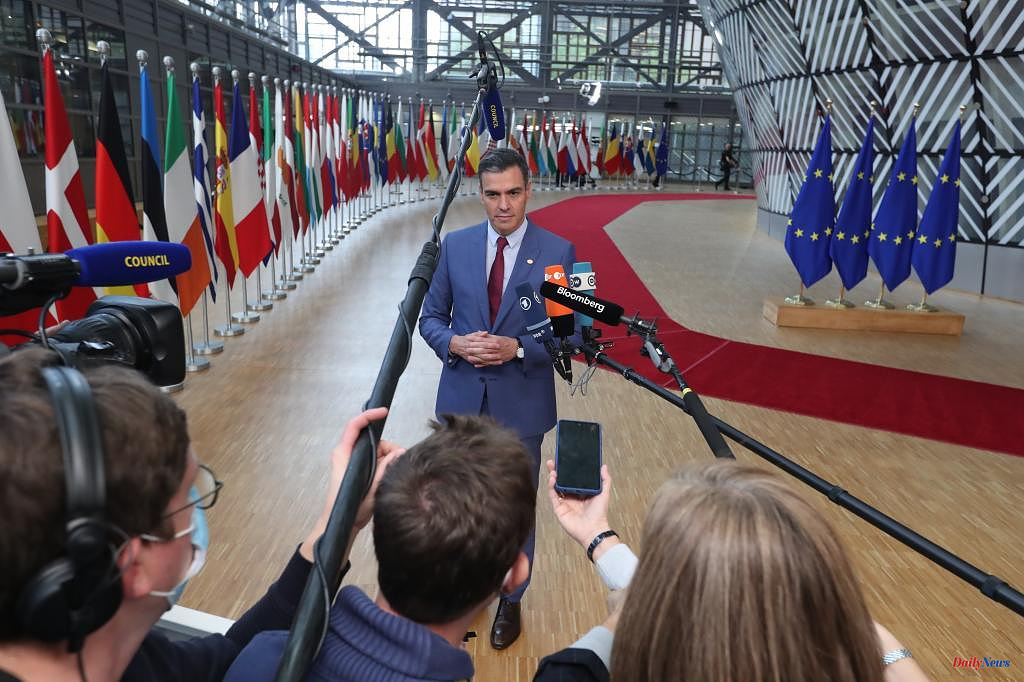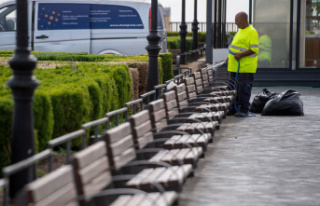Until not so long ago, Brussels had managed to stay reasonably out of the fights of national politics. There were clashes in the Eurocámara, where the deputies of all formations are; there were times when the situation became critical, such as during the Catalan crisis. But in general terms, and within the framework of a shared, uncritical and quite naive Europeanism on the other hand, the Executive, the opposition and the EU had normal friction, equivalent to those of the rest of the partners.
Not anymore. The exchange of letters, accusations, reproaches, statements and meetings in recent weeks over the Doñana water crisis has brought the confrontation to a new level, anticipating six months of mud, exaggerations and political and media misrepresentations during the Spanish presidency of the Council of the EU, which will also coincide with the general elections.
In a country with a complex, which still looks at Brussels with a certain impostor syndrome, the institutions, and above all the European Commission, are seen almost solely as an ATM that distributes funds, as a judge who can resolve national problems, as a Police that can force the prime minister or the leader of the opposition to back down and a verifier that denies hoaxes and legends. She is respected even when she makes controversial decisions, and with a kind of technical aura, without her own agenda, something equally debatable.
The European Parliament was different, a place where, although with nuances and much less impact, everyone could fight according to the traditional rules, with the same tricks, foul play and propaganda as in Congress. The Petitions Commission, taken over by Spanish files, is the perfect example. Something that few people outside the EU understand, which lends itself to easy headlines and totally misinterpretations about the capabilities of the camera, sold as a mixture of the FBI or the Court of Justice.
But these weeks, these strategies have jumped to turning the dispute over Doñana into a community issue, involving the leaders of the European political groups, the commissioners and, indirectly, President Ursula von der Leyen. Something unprecedented, beyond Puigdemont and the independence movement.
The war begins with the proposal of law of the Government of Andalusia for Doñana. The Government immediately positions itself against it, but also the Commission, which sent a very tough letter, signed by the Director General for the Environment, Florika Fink-Hooijer, making it clear that if the changes were being approved, it would go against the European directives. and, they believed, it would harm the area, for which there could ultimately be fines. Juanma Moreno Bonilla's team defended itself, Pedro Sánchez and his ministers turned upside down and began the maneuvers.
PSOE MEPs asked parliamentary questions to the Commission, knowing full well what their position was, in order to present it as more pressure or as a rise in tone, when there was nothing similar, at least at that time. At the same time, the Board requested a meeting with Commissioner Virginijus Sinkevicius, but it went wrong. The Minister for the Environment and spokesman, Ramón Fernández-Pacheco, came out of it saying that Brussels was open to studying his ideas and that his concerns were above all about the CJEU rulings, not so much about the legislation that is being considered. But immediately afterwards the commissioner, already tired and with an unusual tone in this type of exchange, made a much tougher reading public, reiterating that his main concern right now is the legislative changes.
Sinkevicius's response, which made the front pages of all the media, did a lot of damage. There the mud machinery was already activated at maximum power. The Executive, through the mouth of Vice President Teresa Ribera, has said, intoxicating, that there is a risk that Spain will lose funds due to the decision of the Board. Not only is this a more than remote and hypothetical scenario that would require months of infinitely more serious confrontations and an open threat to the rule of law, but this comparison with what has happened with countries like Hungary and Poland has the same basis as the warnings that from opposition parties there have been repeated statements about the freezing of funds due to the blockade of the CGPJ or the appointments to courts by the Executive: none.
From then on there are no filters. From the popular environment, the general director of the Environment was first attacked, insinuating that her position is due to the fact that the son of the Minister of Agriculture, Luis Planas, works on her team. The Commission has confirmed to this newspaper that Planas entered the team making a declaration of conflict of interest and that he has never participated or worked in anything that has to do with Doñana. On Wednesday, the head of the socialist delegation in the European Parliament, Iratxe García , met with Sinkevicius and with the socialist vice president Frans Timmermans, responsible for the Environment and the Green Pact, to discuss directly "about the PP plan to legalize irrigation", but she did it, as she herself said, not as a Spaniard , but as head of the European socialist group, which he has chaired for a few years. Attacking Genoa.
Immediately afterwards, the person in charge of the popular delegation, Dolors Montserrat, also summoned the media. But when she heard that García did it with the European hat, she incorporated Manfred Weber, leader of the European People's Party in the Eurochamber. The German, who in the last year has attacked Sánchez and the Government on all the occasions in which the Spanish delegation has requested it, raised his tone even more, disconcerting the community capital. "I have to be very clear: we see the commissioner wearing a red shirt to campaign for Sánchez and not presenting himself as someone who seeks solutions," Weber attacked the Lithuanian, who is a member of a small agricultural party, with unusual aggressiveness that was applauded. by Cuca Gamarra and Alberto Núñez Feijóo.
Weber, together with Montserrat and the former minister Zoido, also intoxicatedly assured that the Commission was having "party behavior" and that "it was not helping" for not respecting its work as a "compromise seeker." For her part, Montserrat added her criticism. "We are in the middle of the municipal and regional electoral campaign and therefore (we request) that they refrain from partisan communications by the Commission during a campaign and that they are not used by any party during an electoral campaign, that they demand the Government to sit with the Board and that they work calmly, with serenity, all the reports from Doñana".
Weber's words created quite a stir. There were immediate reactions from the Spanish parties, but also from the commissioner himself, who had to go on the Twitter account to defend himself against him. "Doñana is important for Spain and for the EU. I have met with Ramón Fernández-Pacheco, with Teresa Ribera, Manfred Weber, Iratxe García and Dolors Montserrat to listen to all parties. My message is the same: the Commission acts as Guardian of the Treaties, and the implementation of the CJEU ruling is a priority". This Thursday, the spokesperson for Von de Reyen herself also came out: "The president has confidence in all her commissioners (...) The Commission is fulfilling its role in managing a file according to current legislation. There are decisions of Justice in this matter and the Commission strictly adheres to its institutional role", stated Eric Mamer.
In Von der Leyen's team they understand the political pressure, that the elections are approaching, but not the tone. They believe that the situation is getting out of hand and recall that the Doñana case dates back to 2014, when the Socialists were in Andalusia and the PP in Moncloa. And that the CJEU sentence dates back to 2021, so it is not a new case or against any specific party.
The role of Weber, German like Von der Leyen, from the same party, but who was removed in 2019 when he aspired to be the president of the Commission, has not sat well either. Since then the relationship between the two has been tense and no one in Brussels has escaped the fact that Weber has aspirations. He has it very difficult, because Von der Leyen is in a sweet moment, but he courted Feijóo from the beginning and maintains a very close relationship with Esteban González Pons, who was the number two of the PPE in the chamber. In addition, he already had a clash with the same commissioner a few weeks ago over a letter similar to the one he sent to Andalusia, but in this case addressed to the Government of the Netherlands about zero tolerance for changes in emissions targets, a super issue politically sensitive after the spectacular results in the Senate elections of a party of farmers and ranchers whose raison d'être is precisely to fight against these environmental requirements.
On July 1, Spain assumes the presidency of the Council of the EU, it is a rotating role and it does not give concrete power, but it does give control of the agenda, the management of meetings and more visibility. Sánchez, like Macron last year, will take advantage of that microphone for the campaign. And the opposition to attack, as it is already doing, convinced that Von der Leyen, despite being popular, is Moncloa's best ally and guarantor.
For months, several popular MEPs have flooded the Commission with questions about alleged misuse of Next Generation funds, about a lack of transparency, doubts about the reforms. The commissioners respond, systematically, refuting the allegations and, in general, recalling that Spain is one of the most advanced countries in terms of recovery plans. The same happened with the visit of a delegation headed by a conservative German MEP, who managed to make a lot of noise and raise doubts, despite the fact that the Commission's experts on the matter, who were traveling with her, argued otherwise and saw no problem.
But it is ammunition that can be used if there are delays in the coming months or if something ends up running aground, as has happened to Italy, for example, since there are still sensitive issues in social or fiscal matters. Six hard months of national war with Brussels as the battlefield. A taboo has been definitively broken and it will never be like before.
According to the criteria of The Trust Project












